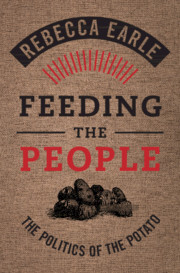Book contents
- Feeding the People
- Feeding the People
- Copyright page
- Dedication
- Contents
- Figures
- Recipes
- Abbreviations
- Introduction Pouring Ourselves a Large Gin
- Chapter 1 Immigrant Potatoes
- Chapter 2 Enlightened Potatoes
- Chapter 3 Free-Market Potatoes
- Chapter 4 Global Potatoes
- Chapter 5 Capitalist Potatoes
- Chapter 6 Security Potatoes
- Conclusions Parmentier, Peasants and Personal Responsibility
- Acknowledgements
- Notes
- Bibliography
- Index
Introduction - Pouring Ourselves a Large Gin
Published online by Cambridge University Press: 25 June 2020
- Feeding the People
- Feeding the People
- Copyright page
- Dedication
- Contents
- Figures
- Recipes
- Abbreviations
- Introduction Pouring Ourselves a Large Gin
- Chapter 1 Immigrant Potatoes
- Chapter 2 Enlightened Potatoes
- Chapter 3 Free-Market Potatoes
- Chapter 4 Global Potatoes
- Chapter 5 Capitalist Potatoes
- Chapter 6 Security Potatoes
- Conclusions Parmentier, Peasants and Personal Responsibility
- Acknowledgements
- Notes
- Bibliography
- Index
Summary
What we eat is our business, or so we generally believe. We also acknowledge that our individual failures to eat properly have a broader social impact, even if we’re not sure what to do about it. These tensions between individual choice, public well-being, and the wealth and strength of the nation were born in the Enlightenment. While states have always worried about the political implications of famine, only in the eighteenth century did the particularities of what ordinary people ate attract the attention of political theorists: it was in the eighteenth century that everyday eating habits became a matter of state concern. New theories about how to build economically successful states led to new ideas about the relationship between individual diets and national resilience—what we might call food security. Concerned to build healthy populations, eighteenth-century political and economic writers increasingly recommended potatoes as an ideal foodstuff. Potatoes had reached Europe in the sixteenth century, when Spanish colonists introduced this Andean tuber. In the Americas the potato has nourished ordinary people for millennia, and it was ordinary people in Europe and elsewhere who were largely responsible for transforming the potato into the global status that it has today.
Keywords
- Type
- Chapter
- Information
- Feeding the PeopleThe Politics of the Potato, pp. 1 - 22Publisher: Cambridge University PressPrint publication year: 2020

